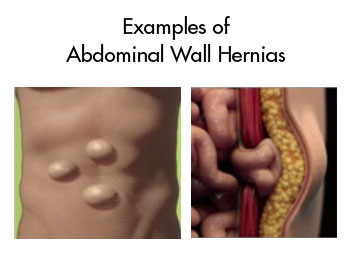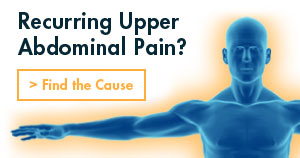About Hernias
Hernia repair is one of the most common surgical procedures performed in the United States but that doesn’t mean they are without risk. When you need hernia surgery, experience counts. The surgeons at Abdominal Surgery Specialists have performed thousands of hernia repairs— from simple to complex— with successful outcomes. There are many types of hernias. Some of the more common types diagnosed and addressed by our surgeons are listed below.
Hiatal Hernia Associated with Acid Reflux
Slightly different from abdominal wall hernias are hiatal hernias, or esophageal hernias. These hernias are due to a weakness or opening in the diaphragm. These hernias cause acid reflux and are also treatable with a surgical procedure for hiatal hernia.
Abdominal Wall Hernias
- Inguinal hernias are the most common type of hernias, and are located just above the leg crease, near or adjacent to the pubic area.
- Femoral hernias are also located in the groin area, and are usually the result of pregnancy and childbirth.
- Ventral or Incisional hernia is a hernia that appears in the abdomen at the location of a previous surgery.
- Umbilical hernias are located near the bellybutton. These can occur at childbirth or anytime after due to a natural weakness from the blood vessels of the umbilical cord.
- Epigastric hernias occur due to a weakness in the upper abdominal wall.
- Sports hernias are generated by a strain or tear in the lower abdomen or groin area, often from weight lifting or extraneous exercise.
You may see an external bulge in the abdomen or groin areas with some of these types of hernias, but some are only noticeable by pain. A hernia is an abnormal opening or hole in the abdominal wall. This may allow abdominal organs to bulge out/protrude through this opening. Hernias may occur due to previous surgeries, childbirth, trauma, or could be congenital. Hernias may cause discomfort, pain, and/or a bulge or swelling in the area of the hernia. The symptoms may be more noticeable when sneezing, coughing, lifting, or during activities causing exertion.
Hernia Symptoms, Treatments & Timing
All hernias should be addressed at the first signs of onset. Early attention to abdominal wall symptoms or hiatal hernia symptoms will ensure a straightforward procedure, a shorter recovery, and drastically decrease the chance of reoccurrence. Hernias do not go away. In fact, the natural course of a hernia is for it to slowly enlarge and worsen over time. They tend to progressively enlarge and cause more pain and discomfort. Currently, the only way to cure a hernia is by surgery.
Learn more about hernia causes, symptoms, and diagnosis by selecting from the options below. Or schedule your appointment today and talk to an expert.



 Breast Reconstruction & Hernias
Breast Reconstruction & Hernias

